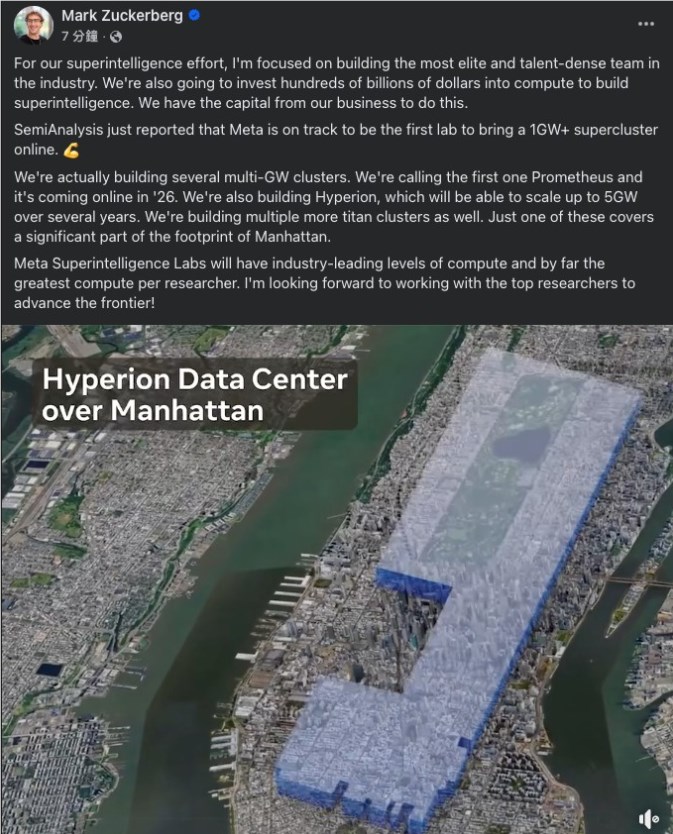Meta Unveils 1GW+ Supercomputer to Boost AI Race
Meta Announces World’s First 1GW+ Supercomputer Cluster
Meta CEO Mark Zuckerberg revealed plans for 'Prometheus,' a groundbreaking supercomputer cluster with power consumption exceeding 1 gigawatt (GW), slated for operation by 2026. The company also teased 'Hyperion,' a future cluster targeting 5GW—comparable to the energy needs of Manhattan. These projects underscore Meta’s ambition to dominate AI infrastructure.
Prometheus: A Computing Powerhouse
The Prometheus cluster will feature 1.3 million NVIDIA H100 GPUs, delivering over 2 exaflops of mixed-precision computing power. Designed for training next-gen AI models like Llama4, it will support multimodal tasks such as real-time speech translation and augmented reality (AR).
Meta’s design leverages the NVIDIA Quantum2 InfiniBand network and the Grand Teton hardware platform (contributed to the Open Compute Project). Developers have hailed Prometheus as a game-changer, calling it a redefinition of AI computing limits.

Hyperion: The Future of AI Infrastructure
The Hyperion cluster, with its staggering 5GW power draw, represents Meta’s long-term vision. While details remain scarce, Meta confirmed plans for liquid cooling and high-performance networking to handle large-scale AI training. The company has earmarked $6–6.5 billion for data center expansion in 2025.
Analysts note Hyperion’s energy consumption dwarfs competitors like xAI’s 300,000-GPU cluster, highlighting Meta’s aggressive investment strategy.
Industry Context: The AI Arms Race Heats Up
Meta’s move comes amid intensifying competition. In 2022, its AI Research SuperCluster (RSC) ranked among the world’s fastest with 16,000 NVIDIA A100 GPUs. Now, Prometheus and Hyperion position Meta against rivals like OpenAI, Google, and Microsoft, which are also scaling up compute investments.
Critics raise concerns over energy use and environmental impact, while supporters argue the clusters will accelerate open-source AI innovation.
Technology and Sustainability Commitments
Meta emphasized its commitment to open-source ecosystems (e.g., PyTorch) and data privacy. Prometheus will operate offline with encrypted data transmission to safeguard user information. However, calls for greater transparency on energy usage persist.
Key Points:
- Prometheus: 1GW+, 1.3M H100 GPUs, launching in 2026.
- Hyperion: Future 5GW cluster, targeting advanced AI tasks.
- Investment: $6–6.5B allocated for data centers in 2025.
- Competition: Direct challenge to OpenAI, xAI, and Microsoft’s Stargate project.
- Open Source: Grand Teton platform and PyTorch integration prioritized.